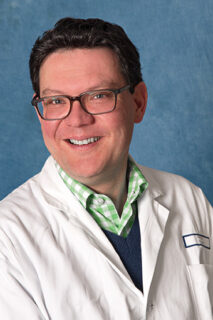Immunotherapy for cancer
Prof. Dr. Udo Gaipl explains the paradigm shift in radiation research
Thirty years on from the Chernobyl reactor disaster, people are still suffering from the consequences of the radiation that was released. This is one of the reasons why it is important to understand how radiation affects the body locally and which systemic concomitant symptoms it produces. Experts in medicine, biology and physics from across Europe are discussing these topics at the annual conference hosted by the Gesellschaft für Biologische Strahlenforschung (Association for Biological Radiation Research, GBS), which is being held in Erlangen from 26 to 28 September 2016. We spoke to the conference president, Prof. Dr. Udo Gaipl, who is head of the radioimmunology group at the Department of Radiation Oncology, Universitätsklinikum Erlangen, about new findings in radiobiology and their applications in cancer treatment.
What exactly is radiobiology and, in particular, radioimmunology?
Traditional radiobiology is the study of the effects of ionising radiation on living things. The main topic of research is local effects on cells, such as the damage to and repair of DNA. In the area of medicine known as radiology, these effects are used in a targeted manner to kill tumour cells. Radioimmunology involves studying the downstream effects, as the damaged and stressed cells change their surfaces and their surroundings. This is important for producing systemic and immune responses to tumours, as well as metastases.
The worst nuclear reactor accident in human history happened in Chernobyl 30 years ago. What do we know about the consequences today?
In addition to the acute consequences such as radiation sickness, these kinds of accidents can lead to long-term damage, such as cancer, as a result of mutations. We also see long-term changes in the immune status of those affected.
Can this knowledge be applied in radiotherapy?
Absolutely. There has been a paradigm shift in radiology in the last few years: on the one hand, radiotherapy has advanced significantly in terms of technology, meaning that considerably higher doses can be applied today to combat tumours. On the other, there is an increasing focus on the systemic components: radiation does not just have intense effects on our DNA at a local level, it also has many systemic and immunological consequences due to downstream processes. We use these abscopal effects of radiation to our advantage by activating the immune system in a targeted manner or correcting immunosuppression that is induced by the tumour.
What can you achieve by doing this?
The combination of radiotherapy and immunotherapy can induce long-term anti-tumour immune responses, which means that after removing the tumour there is still a degree of protection against the same type of cancer occurring again.
The GBS conference involves experts from medicine, biology and physics. What can this interdisciplinary collaboration contribute to developments in radiology?
Firstly, the physicists are constantly working on improving the technology used in radiology equipment. Without them we would not be able to apply such high doses while ensuring that the surrounding tissue is not damaged. The biologists study the mechanisms of radioimmunology in order to provide clinicians with instructions on how radiotherapy should be combined with immunotherapy, and at what intervals. And, finally, the medical researchers implement preclinical data in clinical trials – ‘from lab to clinic and back’, as we say. Overall this collaboration is very fruitful and benefits patients a great deal.
Further information:
Prof. Dr. Udo Gaipl
Phone: +49 9131 8544258
udo.gaipl@uk-erlangen.de
